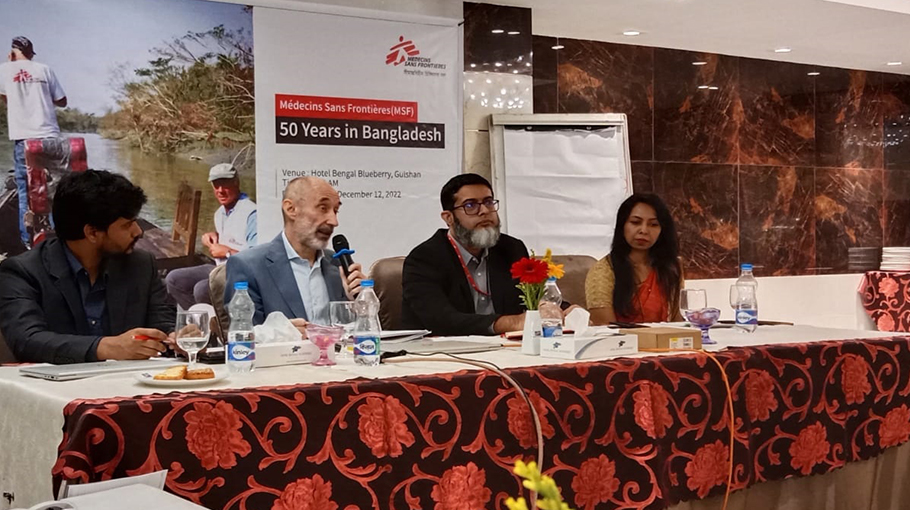Rohingya is the ‘biggest’ humanitarian crisis to Bangladesh: MSF

Country Representative of Médecins Sans Frontières (MSF) Claudio Miglietta on Monday termed the Rohingya issue as "the biggest humanitarian crisis" to Bangladesh.
The international medical humanitarian organisation which is also known as Doctors without Borders provide services to those forcibly displaced Myanmar nationals living in Cox’s Bazar camps.
“In 2017, we have expanded our medical and humanitarian activities to respond to the influx of Rohingya refugees fleeing persecution in Myanmar for safety in Cox’s Bazar. Currently our healthcare facilities have become an important provider of high quality, free-of-charge medical care for patients from the Bangladeshi local community and Rohingya refugees,” Caludio said.
The country representative was interacting with journalists at an event marking the 50 years of service of the international medical humanitarian organisation in Bangladesh.
MSF, which translates to Doctors without Borders, was founded on December 22 in 1971 in Paris by a group of journalists and doctors.
They first sent a team in the newly born Bangladesh in 1972 upon the then government’s request to join the post-war humanitarian efforts.
Since then, they provide medical assistance to people affected by conflict, epidemics, disasters, or exclusion from healthcare.
“It has been 50 years since MSF was founded. Our decision to work on certain crises depends on the magnitude of events, the levels of illness and mortality among the population, the severity of exclusion from healthcare, and the added value MSF can bring to the affected population,” Claudio said.
“These are all criteria that determine our decision to launch medical and humanitarian interventions around the world. According to our principles, we provide medical services to all people irrespective of gender, race, religion, or political affiliation, when they need it most, and that is the reason we are here in Bangladesh.”
They run a range of services in the camps of Cox’s Bazar across 11 facilities.
Services include emergency and intensive care, paediatrics, obstetrics, sexual and reproductive healthcare, treatment for victims of sexual violence, hepatitis C, and care for patients with non-communicable diseases such as diabetes and hypertension.
In addition, MSF is also playing a key role in supporting maintenance of wastewater services and human waste treatment in the refugee camps.
MSF collaborated with the government of Bangladesh by launching emergency interventions to respond to the needs of people impacted by various crises across the country.
“Today we are marking MSF’s longstanding commitment to provide support to people in need including in Bangladesh. Our staff in Bangladesh have been working side by side with local emergency teams to support relief efforts after crises and during disease outbreaks,” the Country Representative said.
“In 2007, MSF provided emergency assistance to help remote communities struck by Cyclone Sidr. In 2010, we partnered with the Ministry of Health to launch a program to treat people who were suffering from kala azar in Fulbaria, and in 2010 we established our project to respond to the health needs of people working in the densely populated area of Kamranghirchar in Dhaka.
They were also awarded for their work to eliminate Kala azar, a neglected tropical disease, from the Fulbari area in Mymensingh district.
“In 2014, we provided emergency assistance in Bandarban, and Chittagong Hill Tracts to support the Ministry of Health in treating people with malaria. During these years and after, MSF also provided support to refugees seeking safety in Bangladesh, in addition to the local population in Cox’s Bazar,” continued Claudio.
Mohammad Abu Taher, Project Coordinator; Imamur Rahman, Head of External Relations, and Dr. Atiya Sharmeen, Medical Coordinator Support of MSF attended the event, among others.




